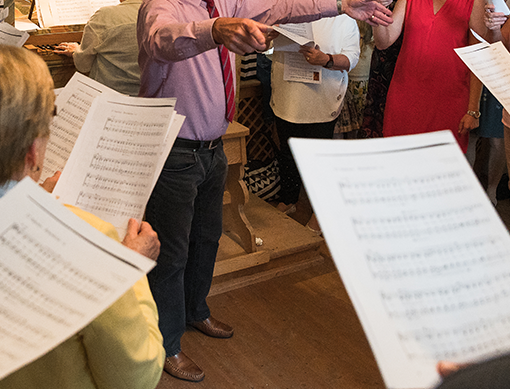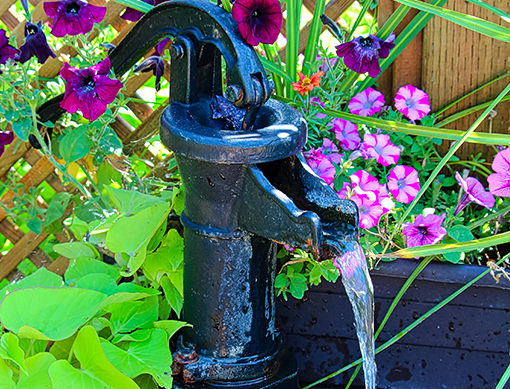Life offers our children and us many lessons. Some seem to be repeated until we actually sit up and take notice.
One important lesson I’ve learned over the years is this: When some part of our lives is in flames, it’s foolish to refuse help from the person, or angel, who brings the fire extinguisher.
Many years ago, when one of my middle sons had his driver’s license for only a few weeks, he fell asleep at the wheel, ran off the highway, and hit an abandoned car, flipping the station wagon he was driving several times before it landed horizontally across a hectic four-lane highway. In addition to everything else, the engine caught fire.
Fortunately, a trucker driving in the opposite direction saw the accident and turned around just in time to put out the flames with a fire extinguisher he kept in the cab of his truck. How different things might have been if that amazing man hadn’t appeared just when he did.
Similarly, my friend’s son was driving home alone from Pennsylvania very late one evening when he had two blowouts. Stuck on a windy mountain road, he quickly realized the precarious position of his car and was certain he was stranded for the night. But just minutes later, bright lights pulled up behind him, and a trucker jumped out of the cab of his 18-wheeler to help. I can’t imagine a more welcomed sight—surely, an angel in the eyes of this young man.
Religious traditions explain angels as messengers of God who often appear in the most unexpected ways and with the uncanny knack of arriving just in the nick of time. Often, if we pay attention, we realize that those acting as angels are humankind. Hopefully, that acknowledgment leads to gratitude.
Gratitude involves realizing that the good that comes to us in our lives often comes from outside ourselves. Helping children become aware of this reality, helping them recognize the angels in their lives, whether they be family, friends, or strangers who appear at the right time, helps them develop the virtue of gratitude.
Encourage children’s awareness by asking them simple questions: Who helped you today? Who made you feel better today? Did you make anyone feel better today?
If we teach children that God is love, then it makes sense that God’s messengers would be sharers of that love. Children grow in courage, humility, and compassion when they become aware of how others reach out to help them and when they realize those times when they might be the angel for someone else.
I’ve also learned there is no age requirement for angels. Sometimes they drive 18-wheelers, and sometimes they need training wheels.
Mary Regina Morrell, mother of six and grandmother to nine, is a Catholic journalist, author, and syndicated columnist who has served the dioceses of Metuchen and Trenton, New Jersey, and RENEW International in the areas of catechesis and communication.
Respect is a mutual gift between two individuals, but in raising and teaching children we often forget that even the youngest of children deserve respect. It is from our respect for them that they learn how to respect others.
As a pre-school teacher, I encountered many children with different talents, abilities, and views of the world. One of my pupils saw the world as filled with color, and his artwork was a result of that view. Purple trees and flying red dogs often graced the page of his crayon masterpieces, filled to the edges with color, until one day a teacher from another classroom stopped in to visit. She walked around the table where this youngster was drawing, leaned over, and said, “Oh, no. Trees are not purple, they are green, and dogs are not red. You should do this over.”
 My student hung his head while I tactfully escorted the teacher to the door so our next activity could begin. When I returned to my student, I sat in the little chair next to him and told him his purple tree was the most beautiful tree I had ever seen, and I would give anything to have my own flying red dog. Certainly, if God made giant rainbow squirrels, which live in the forests of India, he certainly could make flying red dogs.
My student hung his head while I tactfully escorted the teacher to the door so our next activity could begin. When I returned to my student, I sat in the little chair next to him and told him his purple tree was the most beautiful tree I had ever seen, and I would give anything to have my own flying red dog. Certainly, if God made giant rainbow squirrels, which live in the forests of India, he certainly could make flying red dogs.
“Really?” he asked, his face brightening. “Absolutely,” I said, and showed him some of the photos of these amazing creatures.
I explained that not everybody had the ability to see things as colorfully as he did, and there was no reason for him to redo his art. His ability to draw was a gift God had given him.
I remember this experience vividly because when he looked up at me he had the most beautiful of smiles on his face. He then promptly picked up his crayons and added some blue and purple squirrels to his picture.
The next day, during our reading session, I brought out the book with the multicolored squirrels so all the children could see a bit of the magnificence of God’s creation. They “oohed” and “aahed” over the photos with childish wonder and, of course, from then on my young artist was not the only one to have blue, orange, and purple squirrels in his artwork.
The visiting teacher missed an important opportunity for teaching a child respect, by respecting the child’s artistic expressions. Criticism of a child’s sincere efforts is not constructive. Every child needs correction at times, but it is best not to couch criticism as a correction. Correction helps build a child up, criticism tears down.
Respecting a young child’s individuality, their vision, coupled with offering direction when needed, will help a child begin to develop an understanding of what it means to respect others.
Mary Regina Morrell, mother of six and grandmother to nine, is a Catholic journalist, author, and syndicated columnist who has served the dioceses of Metuchen and Trenton, New Jersey, and RENEW International in the areas of catechesis and communication.
When I take care of my grandsons, the oldest and I have a personal joke between us. He will inevitably say, “So Nanny, do you think today will be a hot cup of tea day?”
It came about over several months of caring for them. I would plan to sit down with a hot cup of tea and relax for 10 minutes but would always have to get up for one reason or another. Then, when I finally got to drink my tea, it was always cold.
Once, as I reheated my tea in the microwave, he quipped, “Do you think you will actually get to drink your tea today while it’s hot?” 
I laughed at his observation, and he’s been asking ever since.
For me, having 10 minutes to drink a hot cup of tea is a form of self-care, especially in the busy, boisterous world of caring for four young children.
Being responsible for the care of children is a privilege, a blessing, and a challenge that can easily become overwhelming. However, one of the best pieces of advice I ever received regarding a fundamental practice for child care came from Scripture.
It is part of what is referred to as "the Great Commandment” and is found in the Gospel of Luke: “… love your neighbor as yourself."
The italics are mine to emphasize the critical importance of self-care, extending love to yourself, for parents, grandparents, guardians, or anyone involved in family relationships.
Of course, there is a need for balance, as human nature often leads us to selfishness. Still, an appropriate amount of self-care is not only essential in enabling us to adequately care for others, but it is a responsibility we have to care for the gift of self, given to us by God.
This loving effort extends to our physical, mental, relational, and spiritual health, all of which provide the foundation for our ability to meet the needs of others, particularly our children.
There must be some time set aside for the renewal of our body and spirit.
Realistically, self-care must happen every day and can happen in small but meaningful practices that are healing and healthy.
First, it’s helpful to evaluate what is truly important in our lives at this point in time. What can we let go of, physically or mentally, that will lower our stress levels?
Ask yourself, “What brings me a sense of peace, relaxation, refreshment or simply makes me happy?” My daughter-in-law finds refreshment in a half-hour of making art in a small corner of the family room set aside for her desk and supplies.
A fellow grandparent, who cares for any number of her 15 grandchildren multiple times a week, finds her happy place on her front porch, in the fresh air, with a good book and some homemade pie.
Others find music, baking, writing, gardening, or crafting helps refocus their minds and energies on something positive for themselves.
A friend, who works a very stressful job with long hours, recently emailed me to share that she had finally scheduled overdue appointments for physical therapy and the dentist—problems that had impacted her quality of life and stress levels. She was proud of herself for ending her procrastination, and it brought her a sense of relief.
Good friends are pillars of support. Having someone who understands what we are going through or who is at least truly interested in what we are going through is an opportunity to share our feelings, which is a critical element of self-care.
Accomplishing these practices requires we enlist our family members’ cooperation. It may take repeated conversations and standing our ground, but children need to understand that even parents need to take care of themselves.
I am happy to report that I have finally accomplished having a hot cup of tea during 10 minutes of peace and quiet, courtesy of my three-year-old grandson, who now announces to the others, “It’s time for Nanny’s tea!”
We will see what tomorrow brings.
Mary Regina Morrell, mother of six and grandmother to nine, is a Catholic journalist, author, and syndicated columnist who has served the dioceses of Metuchen and Trenton, New Jersey, and RENEW International in the areas of catechesis and communication.
When my youngest was three years old, our family went to a barbecue at my oldest son’s high school. My husband drove his work van so he could bring grilles, food, and my oldest to help out, and I drove our station wagon with the rest of the boys.
When the day came to a close and we walked back to the parking lot, the youngest said, “I want to go with daddy.” I explained there was no room in the van for him so he had to go with me. It didn’t matter. His request soon became a high-pitched whining, accompanied by feet dragging. “I want to go with daddy!”
I pulled him along and tried to put him in his car seat, but he hooked his little fingers around the metal track on the roof of the car. I struggled to dislodge his fingers with one hand and with the other, I tried to get him in the car, all the while with him screaming, “I want to go with daaaaaadddddyyy!”
A monk from the school was passing by so I elicited his help, asking him to pry my son's fingers loose from the track while I pushed him into his car seat. He agreed and made a valiant effort, though at one point he pleaded with me, “Why don’t you just let him go with his dad?”
I laughed.
Once my son was secured, and I could close the door on his whining, I explained to the monk that, first of all, there really was no room, and most importantly, if I gave in to my son’s request simply to avoid an uncomfortable situation I would pay for it in the long run and my son would learn he never had to accept no for an answer.
He said he understood my reasons, but wondered how I had the patience to deal with it without losing my temper.
“I’ve had 17 years to practice.” I said, and shared a very useful insight from Bishop Fulton J. Sheen: “Patience is power. Patience is not an absence of action; rather it is ‘timing.’ It waits on the right time to act, for the right principles and in the right way.”
“Now is the time,” I said. “If I respond with anger, frustration, or yelling, I could reinforce the very behavior I want to nip in the bud. And who wants another 15 years with a bad-tempered child?”
He chuckled, and as a religious and a person who has worked for years with boys going through their adolescent years, I knew he understood that patience, as a fruit of the Holy Spirit, grows as we grow in our desire to know God.
But, as lessons do not always take effect immediately, back at the barbeque we were in for a bumpy ride on the way home. I was forced to keep my finger on the close button of the automatic lock because my determined little toddler kept unlocking his door and trying to open it with the intent of getting out to “go with daddy!”
When we finally got home and got him out of the car, he threw himself on the ground and refused to go into the house. His brothers each grabbed an arm or leg and carried him into the kitchen where they deposited him on the kitchen floor.
His tantrum continued until he realized there was no one there watching him. We sat in the living room, trying to suppress muffled laughter. When he found his audience, he promptly threw himself on the ground again. It would have made a great social media video.
Learning and practicing patience is an ongoing effort. Even now, I still have to remember the value of patience in any situation. In retrospect, I will admit that those times when I lost my patience, especially as a parent, grandparent, or in a relationship, are those times I regret the most. Harsh words, impetuous decisions, and hurtful behavior might have been avoided if I remembered one simple mantra more often: Patience is power.
Mary Regina Morrell, mother of six and grandmother to nine, is a Catholic journalist, author, and syndicated columnist who has served the dioceses of Metuchen and Trenton, New Jersey, and RENEW International in the areas of catechesis and communication.
On my bookshelf is a very small volume entitled “Dear Professor Einstein.” This book of Albert Einstein’s letters to and from children is dog-eared because it combines two of my favorites—the genius, the teacher, and the refreshingly human Albert Einstein, and the hilarious, often poignant, honesty of children.
The letters are an expression of the innate curiosity of children, who seem to understand, as does Einstein, that the freedom to share thoughts and express creativity is integral to human growth and happiness.
The need for such expression seems to be born with us, a part of our human spirit. But Einstein, one of the most influential people in human history, believed that the spirit of learning and creative thought were often lost through rote learning. He wrote, “It is the supreme art of the teacher to awaken joy in creative expression and knowledge.”
Einstein knew that when there is joy, there is learning. Where there is learning, there must be listening—a practice he greatly valued, not only as a physicist but as a philosopher who understood the needs of the human spirit.
Listening is crucial to learning, especially when we are lost or stuck and needing to find a way to move forward. As Jimmy Buffett of Margaritaville fame once said, “Older and wiser voices can help you find the right path if you are only willing to listen.”
It’s good advice for people of all ages. There is always someone older or wiser, than us.
We can help our children learn to listen to those voices of experience and wisdom by telling them stories—bits of family history, embarrassing moments, inspirational accomplishments, and inspirational people. It simply needs to engage their attention.
When the story is over, we can invite them to share their thoughts or stories of their own to become listeners. The experience of sharing stories of the heart, being allowed to ask questions, and discuss ideas within a community of love and shared beliefs can be transformational.
Some people are natural-born listeners, but most are not. It is a skill that can be developed when children experience opportunities for listening, which is a crucial part of being present to others.
There is available wisdom in every moment that we listen, but listening requires focus— though not only on ourselves. By learning to listen, we, and our children, develop empathy with others by truly making an effort to understand what the other is feeling or saying, with or without words.
Philosopher and theologian Paul Tillich put it succinctly: “The first duty of love is to listen.”
Mary Regina Morrell, mother of six and grandmother to nine, is a Catholic journalist, author, and syndicated columnist who has served the dioceses of Metuchen and Trenton, New Jersey, and RENEW International in the areas of catechesis and communication.
by Mary Clifford Morrell
“Creativity - like human life itself - begins in darkness,” writes Julia Cameron, in the “Artist’s Way.”
Certainly, the darkness of the past year and a half is proof of that, with both adults and children struggling to find a way to not lose their sense of security, purpose, and passion in a unique time of isolation.
Many are finding, as we emerge into the light, that there is still work to be done to confront the residual anxiety, grief, and fear.
The simple and profound act of creating may serve as meaningful support for many. It helped me tremendously.
When my dad died unexpectedly, leaving me to care for my terminally ill mom, my emotional life started on a downhill spiral. I had six sons at home, all at different stages of maturity or lack thereof, I worked full-time and was trying to finish grad school.
As an only child shouldering the final arrangements for my dad, grieving was put on hold as I also made plans to take my mom home with me to live out her days with her family.
It required a year off from grad school, relying heavily on the wonderful team from Haven Hospice and cooperation from all my sons and husband. Still, I found myself slipping. I knew I had to do something to maintain my emotional health.
My lifeboat came in the form of the parish choir.
Actually, it was not my idea to join. It so happened that, on one particular Sunday, I brought my grief, frustration, and fear to church and gave God an earful – because I knew God could take it and I needed to give it. I demanded of God, “Just how do you expect me to handle all this?”
Immediately, I felt a tap on my shoulder. I turned to see a very tall and handsome man smiling at me. He said, “You should join the parish choir.”
Seriously? I thought, directing my irritation to God. That’s your solution? One more thing to do?
Not wanting to be rude to the gentleman, I replied sheepishly, “You think so?”
“Absolutely,” he said. “You have a lovely voice. I can take you up to the choir director and introduce you. She’s up there playing the organ.”
Jerome and his wife, Pat, both choir members, would become good friends, as would many of the other choir members I would meet and sing with over the next 25 years.
I discovered singing was a way for me to create something beautiful, and my new choir friends were a lifeline to care, compassion, and presence that I have turned to frequently over the years for support, especially when singing was no longer possible because of the pandemic.
There are few among us who haven’t been knocked down by a crisis, but not everyone is fortunate to have the kind of support that is needed to get back up. Sometimes you have to create your own support network.
Music and singing are powerful tools of transformation, but the same can be said of all creative endeavors—art, dancing, writing, gardening, cooking, jewelry making, carpentry, recycling trash into sculptures, whatever moves your soul. The human person was designed to create, and when we do we find the piece, or pieces, that make us whole.
This can be incredibly healing for children, as well as adults, especially when they have been deprived of physical interaction with friends and family. Creating is an outlet for wounded emotions, and an opportunity to develop a sense of accomplishment and pride in their own creations.
I am continually inspired by my grandchildren when I hear them say, “Look what I made!” I also keep a favorite quote from author and creator, Austin Kleon, on my desk as a frequent reminder to nurture my creative spirit: “In my experience, it's in the act of making things and doing our work that we figure out who we are. You're ready. Start making stuff.”
Mary Regina Morrell, mother of six and grandmother to nine, is a Catholic journalist, author, and syndicated columnist who has served the dioceses of Metuchen and Trenton, New Jersey, and RENEW International in the areas of catechesis and communication.
If someone were to ask me what one of my greatest challenges as a parent is, I would quickly admit to overthinking—a form of mental clutter.
Overthinking, I believe, is often at the heart of much anxiety, worry, even insomnia, all of which seem to be, not surprisingly, at epidemic levels today. How often do we think, “If I could just turn off my brain for a while, maybe I could get some sleep.”
 While I haven’t completely overcome my excessive worrying about my children, grandchildren, or family members, over the years I have discovered a helpful practice.
While I haven’t completely overcome my excessive worrying about my children, grandchildren, or family members, over the years I have discovered a helpful practice.
Embrace the white space.
After many years as a writer and newspaper editor, one of the things I truly appreciate is white space—that space on a page that is empty of images and text. One might think of it as space that is not being used, but, in reality, it is an element of design.
Designers who master the element of white space are masters at their craft, ensuring that the images and words needing the most attention get it, protected from competing distractions by a glorious use of negative space; purposeful emptiness.
A similar need is a crucial part of instrumental and choral music—the space between the notes. Without the rests and breaths that are a crucial part of a composition, music would be overwhelming for the instrumentalists and leave singers breathless. A composition would also be devoid of feeling and significance, with notes running into notes and no space to define what’s important.
When we don’t define what’s important in our own physical and mental space, we may end up feeling like we are overwhelmed, unable to breathe, or to focus on those things which bring us joy.
Embracing the white space in our lives means prioritizing our need for times devoid of visual or mental noise, to have space to rest, to pray and to listen—for ideas, for solutions to problems, for inspiration and assurance that, as Julian of Norwich observed, “All will be well.”
This practice may require a commitment from the whole family and can serve as a good time for conversations about what is important for you as a family and as individuals.
Which activities are essential, for parents or children? Which toys are most often used or loved? Which chores may be delegated so that mom or dad has a little more space to breathe and children develop a keen sense of being capable and helpful members of the family? Each family would have its own unique list.
Happily, adults are not the only ones to benefit.
Child and teen specialists explain even brief periods of quiet daily offer children and youth an opportunity to decompress, to develop creativity and mindfulness, and serve as a reset for minds routinely overstimulated by social and media interactions.
The important thing to remember is that even change made in baby steps is positive.
As I continue to strive to overcome overthinking and improve at the practice of creating space in my life for what’s most important, I often reflect on the words of author Antoine de Saint-Exupery: “Perfection is achieved not when there is nothing left to add, but when there is nothing left to take away.”
Mary Regina Morrell, mother of six and grandmother to nine, is a Catholic journalist, author, and syndicated columnist who has served the dioceses of Metuchen and Trenton, New Jersey, and RENEW International in the areas of catechesis and communication.
A few weeks ago, a delightful image popped up in my social media feed. It was a baby owl, sitting on a branch, but leaning over as far as possible so he was looking back at me from an upside-down position.
That’s a different perspective, I thought, later considering how valuable looking at things from a different perspective can actually be.
That thought has been part of my daily reflections since then, so I was intrigued when the celebrant for the Feast of the Ascension Mass spoke about perspective in his homily.
 He spoke about taking a drive up the mountain and the lovely sights one can see, but, he said if you really want to see everything you have to pay attention on the drive back because you will see things you didn’t see on the way up. The drive back on the same road offers a new perspective.
He spoke about taking a drive up the mountain and the lovely sights one can see, but, he said if you really want to see everything you have to pay attention on the drive back because you will see things you didn’t see on the way up. The drive back on the same road offers a new perspective.
I have found that to be true, often very surprised at what I have missed driving somewhere. I often find myself noticing an old home, an interesting store, or a lovely patch of flowers and thinking, “Wow, I didn’t notice that before.”
He related those two perspectives—the drive up and the drive down—to us walking with Jesus before his ascension and how we understand him and the events of his life in light of his Ascension.
Prior to his Ascension, the disciples had doubts and perhaps considered if all that had happened was a failure. Had Jesus acquiesced? He allowed all that had happened to happen without any push back.
The celebrant explained that we, like the disciples, must travel the road twice, the second time reliving the events of Jesus’ life; not seeing Jesus reduced to weakness but manifesting his power, a divine power which leads to forgiveness, renewal, reconciliation, and rebuilding.
Jesus tells the apostles, “But you will receive power when the Holy Spirit comes on you; and you will be my witnesses in Jerusalem, and in all Judea and Samaria, and to the ends of the earth” (Acts 1:8).
Part of our growth as disciples is to also look at ourselves, from time to time, with a different perspective to evaluate how well, or if, we are allowing the power of the Holy Spirit to work in our lives.
Trappist monk Thomas Merton observed, “We cannot see things in perspective until we cease to hug them to our own bosom.” It is human nature to believe the way we see things the first time around is the right way, the only way, to see and understand them.
The gifts of the Holy Spirit can help us take that second drive up the mountain.
Mary Regina Morrell is a Catholic journalist, author, and syndicated columnist who has served the dioceses of Metuchen and Trenton, New Jersey, and RENEW International in the areas of catechesis and communication.
Several years ago, my husband found an old hand water pump in his customer’s garbage and brought it home to create a lovely water feature in the corner of our yard. Like an abundant wellspring, water streams continuously from the pump into a small metal bucket and then a large barrel.
The overflow waters the flowers planted among the rocks around the barrel, and there is constant chatter from birds of all sizes socializing, drinking, and bathing. Sometimes a family of deer visits, and in the morning, the barrel is empty, and the water has stopped pumping.
 My grandchildren love to play in the barrel and believe the water comes from a spring in the ground. One day, my young granddaughter noticed the water wasn’t flowing and yelled to me, very concerned, ‘Abuela, the spring is dry!”
My grandchildren love to play in the barrel and believe the water comes from a spring in the ground. One day, my young granddaughter noticed the water wasn’t flowing and yelled to me, very concerned, ‘Abuela, the spring is dry!”
I nodded my head, thinking, that’s exactly how I feel on some days. There is no way I can be a source of nourishment for others when I can barely get through the day myself. And then we filled up the barrel together, and water flowed from the pump again. To her, it was amazing. We had saved the day.
I believe most people sense that we are so much more than simply flesh and blood. There is a divine source of life, God’s wellspring of spirit, creativity, and goodness of unfathomable depth within each of us. Sometimes we lose touch with that source. Sometimes just the daily work of life cuts it off, and we struggle to be who we want to be, who we know we can be.
Sometimes we forget we are God’s creation of love. When I find that happening, I turn to Psalms 139 and reflect, especially, on these beautiful words: “You formed my inmost being; you knit me in my mother’s womb. I praise you because I am wonderfully made; wonderful are your works! My very self you know.” (Psalms 139:13-14)
I am learning to spend time unraveling the weeds and pulling out the stones, one by one, that is holding back my wellspring, aided by one little person who reminded me I am worth the time when she threw her arms around my waist and said, “Abuela, what would the birds do without you?!”
More like, what would I do without the birds? But it never hurts to see yourself through the eyes of those who love you. Wonderfully made.
Mary Regina Morrell is a Catholic journalist, author, and syndicated columnist who has served the dioceses of Metuchen and Trenton, New Jersey, and RENEW International in the areas of catechesis and communication.
A number of years ago, when I was writing a column on leadership, I shared a story that bears repeating:
As a mom of many, my thousands of trips to the supermarket have taught me an important truth. The chances of my leaving at least one bag of groceries behind are pretty high. The chances of my retrieving what I’ve lost are just about zip.
 So when I was leaving the supermarket, my attention quickly turned to a young man who whizzed by me yelling, “You left this behind!” High above his head, he held a plastic bag containing a carton of eggs.
So when I was leaving the supermarket, my attention quickly turned to a young man who whizzed by me yelling, “You left this behind!” High above his head, he held a plastic bag containing a carton of eggs.
When it seemed he would lose his customer out the revolving front doors, he quickly shouted, “MOM! You left this!”
In an instant, the woman had spun on her heels and was facing the young man. Realizing that a stranger was holding her grocery bag, she began to laugh, explaining that, for a second, she thought it was her son calling her, and that she always turns around when she hears “Mom!”
Most moms would agree, it’s instinctual.
Obviously, the young man had learned that lesson, as well, having observed that just about any mom will respond to that small but powerful word. With a big smile, and certainly happy to be of service, he still apologized for using the strategy saying, “Sorry for any disrespect, M’am. I just wanted to make sure you got your package!”
My original focus for the column was on the young man and the leadership skills that were obviously developing in spite of his young age. But, with Mother’s Day having just passed and May being the traditional month to celebrate the Mary, Mother of God, it seems appropriate to focus now on the power of the title, mom.
There is an incredible bond that develops between a mother and a child which propels a mother to put their child’s needs before their own, to sacrifice whatever is necessary for the child, to feel in the deepest part of their hearts their child’s fears, pain, and doubts, and be compelled to do what is necessary to comfort them and ensure they feel safe and secure, and happy.
Mary, as Our Lady of Guadalupe, expressed many of these sentiments to Saint Juan Diego when she said, “Do not be troubled or weighed down with grief. Do not fear any illness or vexation, anxiety, or pain. Am I not here who am your Mother? Are you not under my shadow and protection? Am I not your fountain of life? Are you not in the folds of my mantle? In the crossing of my arms? Is there anything else you need?”
At the heart of the power of mom is love, fueled by passion and prayer which is often beyond understanding.
Pope Francis observed, “A society without mothers would be a dehumanized society, for mothers are always, even in the worst moments, witnesses of tenderness, dedication and moral strength. … Dearest mothers, thank you, thank you for what you are in your family and for what you give to the Church and the world.”
Mary Regina Morrell is a Catholic journalist, author, and syndicated columnist who has served the dioceses of Metuchen and Trenton, New Jersey, and RENEW International in the areas of catechesis and communication.
Pagination
Latest
Categories
Archives
- February 2015 (2)
- March 2015 (2)
- April 2015 (5)
- May 2015 (3)
- June 2015 (6)
- July 2015 (3)
- August 2015 (5)
- September 2015 (5)
- October 2015 (4)
- November 2015 (2)
- December 2015 (1)
- February 2016 (2)
- March 2016 (1)
- April 2016 (2)
- May 2016 (2)
- July 2016 (2)
- August 2016 (2)
- September 2016 (1)
- October 2016 (5)
- November 2016 (1)
- December 2016 (3)
- January 2017 (2)
- February 2017 (3)
- March 2017 (2)
- April 2017 (1)
- June 2017 (2)
- July 2017 (2)
- August 2017 (1)
- April 2018 (1)
- October 2018 (2)
- December 2018 (2)
- February 2019 (3)
- March 2019 (2)
- April 2019 (2)
- May 2019 (3)
- June 2019 (1)
- July 2019 (16)
- August 2019 (8)
- March 2020 (4)
- April 2020 (6)
- May 2020 (8)
- June 2020 (7)
- July 2020 (5)
- August 2020 (7)
- September 2020 (4)
- October 2020 (5)
- November 2020 (9)
- December 2020 (11)
- January 2021 (10)
- February 2021 (8)
- March 2021 (5)
- April 2021 (4)
- May 2021 (4)
- June 2021 (5)
- July 2021 (2)
- August 2021 (3)
- September 2021 (4)
- October 2021 (4)
- November 2021 (2)
- December 2021 (5)
- January 2022 (4)
- February 2022 (4)
- March 2022 (9)
- April 2022 (7)
- May 2022 (9)
- June 2022 (12)
- July 2022 (7)
- August 2022 (10)
- September 2022 (9)
- October 2022 (11)
- November 2022 (8)
- December 2022 (7)
- January 2023 (2)
- February 2023 (10)
- March 2023 (9)
- April 2023 (10)
- May 2023 (8)
- June 2023 (4)
- July 2023 (3)
- August 2023 (2)
